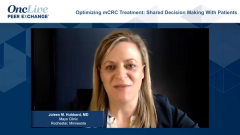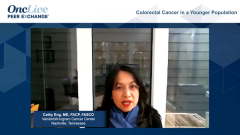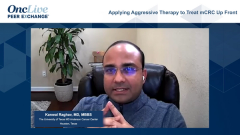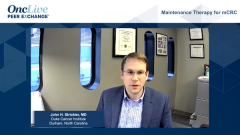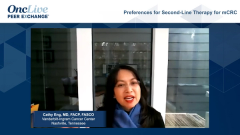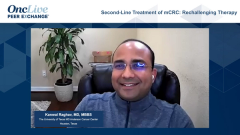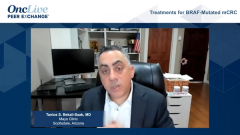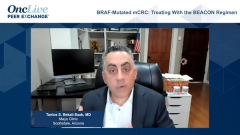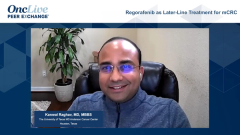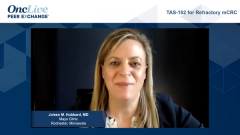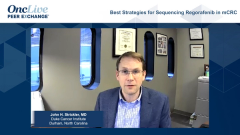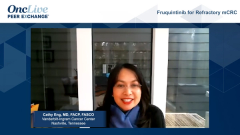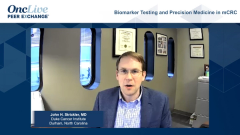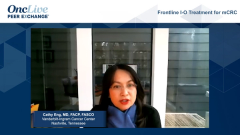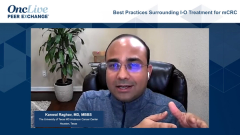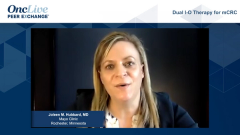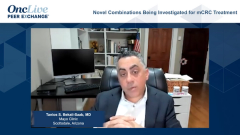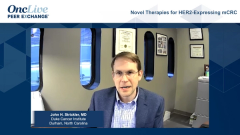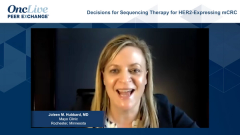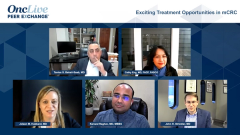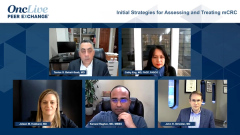
Treatments for BRAF-Mutated mCRC
Considerations for treating BRAF-mutated metastatic colorectal cancer with the combination of a BRAF inhibitor plus anti-EGFR agent based on recently presented data.
Episodes in this series

Tanios S. Bekaii-Saab, MD: Often, we’re all faced with these frustrating situations where you’re seeing the patient, and the tissue is in limbo somewhere between 2 hospitals and a clinic. The patient comes to you and you know this patient has a BRAF mutation, behaving like a BRAF mutation. This is where you’ll find it pretty useful to get those liquid biopsies from day 1. Turnaround time is quick, as you’re waiting for tissue, but we have to be a good custodian of our resources. BRAF mutations behave very differently. Do you always consider FOLFOXIRI [folinic acid, fluorouracil, oxaliplatin, irinotecan] as your first-line option for BRAF V600E-mutated colorectal cancer, outside of a clinical trial?
John P. Strickler, MD: The basic principle here with someone who has a BRAF V600E-mutated metastatic colorectal cancer, is that this disease has an aggressive natural history. We know from prior studies, before we had some of these newer agents, that these patients lived sometimes a year or less. Often, they were not able to even take a second line of therapy.
In a fit, otherwise healthy patient, who’s able to tolerate the triplet regimen of FOLFOXIRI [folinic acid, fluorouracil, oxaliplatin, irinotecan], it would be reasonable to do that, and I would try my best to do that. There are also times when these patients either come in with significant complications related to their rapid spread of disease or maybe advanced stage where we can’t do the triplet regimen. The bottom line is I will do it when I can, but not always.
Tanios S. Bekaii-Saab, MD: The patient starts with FOLFOXIRI [folinic acid, fluorouracil, oxaliplatin, irinotecan], and most of these patients are quite chemotherapy resistant and they progress rapidly. So what do you do next?
John P. Strickler, MD: Fortunately, we have recent evidence and we have a nice phase 3 trial looking at the BRAF inhibitor encorafenib with anti-EGFR antibody cetuximab. We know that in second line and beyond that combination is superior to more of the traditional standard of care, which would have been FOLFIRI [folinic acid, fluorouracil, irinotecan] plus an anti-eGFR therapy. That trial, of course, is the BEACON trial, a large, randomized phase 3 that was reported a couple of years ago and updatedsurvival results at ASCO [the American Society of Clinical Oncology annual meeting] last year. That has become the FDA-approved regimen and is our preferred regimen in the second-line setting and beyond.
Tanios S. Bekaii-Saab, MD: It’s intriguing to me that here we’re adding an EGFR inhibitor, the RAF inhibitor, in patients who technically, because of the BRAF V600E mutations, would not respond to EGFR inhibitors. Maybe you can guide us a little on that. What was the rationale for the study? Then there was also an arm that added a MEK inhibitor, and that ended up not panning out as much, at least for the approval process.
Kanwal Raghav, MD, MBBS: The reason anti-EGFR doesn’t work in these BRAF mutations is because the activation is downstream. It’s the EGFR, RAS, RAF, MEK pathway, and essentially with BRAF mutations, just like with KRAS mutations, the activation is downstream, so adding a single-agent anti-EGFR is probably not going to be effective. Contrary to what we saw in melanoma, when you add a BRAF inhibitor, it actually leads to an upregulation of EGFR. Therefore, a single-agent BRAF inhibitor in studies in colorectal cancer were also not very successful.
The rationale there was if you combine a BRAF inhibitor, you block the originating signal, and then you add an anti-EGFR to block that upregulation that happens once you block the BRAF signal. The effect is still being brought about by BRAF, but the EGFR is preventing the escape mechanism from that BRAF. Adding the MEK was just another layer that we thought would add a significant benefit because now you’re blocking all the 3 players in that pathway.
Clearly, the results of BEACON showed us that even though it’s beneficial to add the MEK in the middle, that the benefit is not substantially or significantly more than just doing BRAF and then EGFR. From that perspective, I agree with John. These are patients where you should never use anti-EGFR without a BRAF inhibitor.
In the first line, you’re probably using FOLFOXIRI [folinic acid, fluorouracil, oxaliplatin, irinotecan], FOLFIRI [folinic acid, fluorouracil, irinotecan], FOLFOX [folinic acid, fluorouracil, oxaliptain] with BEV [bevacizumab], whatever combination you can. But if you find early signs of progression, I’m looking for opportunities to move them to a BEACON kind of regimen because that’s where they respond most. Hopefully, that will not be the status going forward if these regimens prove to be effective in first line.
Tanios S. Bekaii-Saab, MD: It is interesting, we’re seeing the same difference with the G12C mutation, with targets in KRAS G12C. Where you actually have to add the EGFR inhibitor to induce responses, again, along the same pathway. Joleen, the other intriguing aspect of this trial is when you add the EGFR inhibitor to the RAF inhibitor, you end up with fewer toxicities than with either alone. When you add the MEK inhibitor you actually end up with a nuclear explosion. But those two, the cetuximab and encorafenib, seem to abrogate each other’s toxicity. What do we know about that? Is that something that they’ve seen in other studies, or is it just in colorectal cancer? Is it an EGFR effect? Is it a RAF effect?
Joleen M. Hubbard, MD: We have some data from the melanoma research that are showing similar results. We don’t completely understand if it’s the EGFR or the BRAF effect. What’s interesting is I don’t see the degree of the rash that I normally do. I suspect it has something to do with the BRAF mechanism being the most powerful in that combination being a little better tolerated. I’ve found in older individuals that remarkably they tolerate it fairly well, and I’ve treated patients with BRAF cancers in their 80s who have done wonderfully. It is an interesting phenomenon; it’s a relief, to be honest, that they don’t get quite the degree of skin toxicity and diarrhea that we would see.
Tanios S. Bekaii-Saab, MD: Their quality of life is better.
Transcript Edited for Clarity


